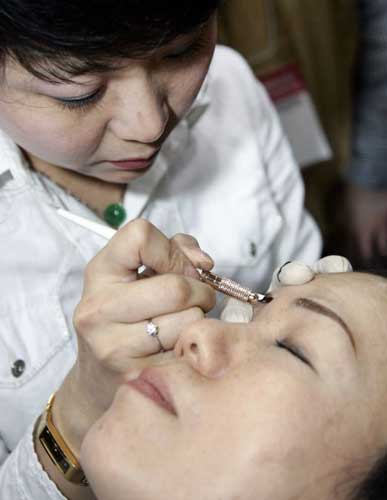The beauty business calls for hard science skills and killer sales talents

It's an enduring childhood memory: a shiny department store with long, white beauty counters staffed by perfectly coiffed women eager to demonstrate their latest products. The shop floor of the beauty industry may not have changed much over the years, but the back-room business has. It offers a range of career opportunities for all types of graduates. Those with a science background could find themselves working on the a wrinkle-busting wonder cream in research and development, while those who want to focus on sales could help deliver a killer ad campaign for a new fragrance.
Lucy Moulton, 22, is a regulatory technologist for Badgequo, a firm that makes cosmetics for high-street retailers, and her job is to ensure products meet the EU's requirements, which can include checking that the correct language is used on packaging. Moulton completed one of only a handful of cosmetic-science degrees offered in the UK at the London College of Fashion and says that a job in the beauty industry is a dream come true.
"I've always been interested in fashion and beauty and I'm an avid Vogue reader," she says. "But I also enjoyed science at school and didn't know how to mix the two. I was doing A-levels in chemistry and biology when my tutor found the cosmetic-science course at the London College of Fashion. The link between the fashion and beauty industries is huge, so it was the perfect place to study."
The four-year course includes a year out in industry, where Moulton had the chance to work in a lab researching new technologies. She has chosen to take a more creative route and concentrate on product development but is continually surprised at the innovation in the industry.
"The technology used in the beauty industry is outstanding and is improving all the time," she says. "It's a fascinating process developing new products and improving existing ones. It is very creative but you keep a science element, and that gives people the best of both worlds."
There are other aspects to the beauty industry beyond product development. Graduates can choose to become involved in the manufacturing of products, quality control, safety testing and product evaluation. All this happens before a product hits the shelves. Beyond that, there are the sales, marketing and purchasing arms.
Despite the plethora of opportunities, the industry has a problem recruiting male graduates. New research by L'Oréal found that more than one-quarter – 27 per cent – of men aged 18 to 34 believe the image of the industry is the biggest drawback to a career in cosmetics, compared with 25 per cent of women, who see it as the main advantage.
According to Ed Foy, 25, an assistant brand manager for the luxury skincare brand Kiehl's, being one of the few men in a woman's world can be an advantage.
"Sometimes I feel my voice is listened to more just because I bring a different perspective," he says. "The gender disparity is being addressed by the industry from an equality standpoint and a practical point of view, since we have more male customers now. But it's a slow process."
The Oxford graduate went through L'Oréal's one-year graduate scheme and since 2005 has worked for Lancôme, L'Oréal Paris and completed a stint in Singapore for the Body Shop. Responsible for product launches, publicity and product placement, he says the best part about working for such a global company is the travel opportunities that it offers, as well as the many creative challenges.
"The learning curve is steep at L'Oréal but the rewards are good. Many firms promise travel opportunities, but don't actually deliver on them. I'm lucky to have already experienced several different brands and worked abroad."
The low-down
The Society of Cosmetic Scientists offers a part-time Diploma in Cosmetic Science ( www.cosmeticlearning.com).
London College of Fashion's cosmetic-science degree focuses on research and development, manufacturing, sales and marketing ( www.fashion.arts.ac.uk). You can also take the course at London Metropolitan University ( www.londonmet.ac.uk).
New cosmetic scientists can earn £15,000 to £23,000 a year. The starting salary for the L'Oréal graduate scheme is £27,000 ( www.loreal.co.uk).
Useful links: Personal Care Products Council ( www.personalcarecouncil.org)
www.cosmeticsbusiness.com for job advertisements, industry news and information about cosmetics companies.
Subscribe to Independent Premium to bookmark this article
Want to bookmark your favourite articles and stories to read or reference later? Start your Independent Premium subscription today.

Join our commenting forum
Join thought-provoking conversations, follow other Independent readers and see their replies